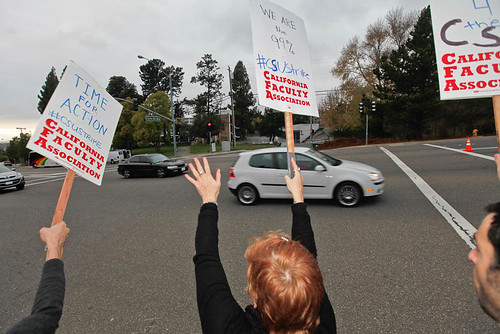
Another backlash against budget cuts and sacrifices to the education system may hit campuses in the next several months if the California Faculty Association approves a strike in mid-April.
CFA is currently asking members to pledge to vote yes on a potential strike.
The CFA and California State University administration disagree on a renewal contract that expired June 2010. The two sides are currently in mediation of the bargaining process, in which an appointed mediator from both sides tries to negotiate a contract.
“Imagine you’re at the flea market. If you offer the person a price she doesn’t want, she’s going to counteroffer. That’s the process that’s been going back and forth, and imagine one person won’t counteroffer and the other person is stuck or moving to impasse,” said SF State CFA President Wei Ming Dariotis.
The next step after mediation includes a panel from both parties presenting their case to a neutral third party representative that prepares a report with recommendations for action. If an agreement is still not made, both sides will present a final offer, and a strike can legally be called.
The proposal by the CSU includes an evaluation process before lecturers receive tenured employment, and requires faculty to report outside employment consistent with a recommendation by the Bureau of State Audits, according to CSU spokesman Erik Fallis.
“We have a certain amount of funding from the state to provide for a certain number of students. If we use some of that for summer education, we would have less of that available to serve students during the school year. If you’re teaching extended education, there is some difference (from teaching during the regular school year),” Fallis said.
According to CFA spokesman Brian Ferguson, the primary concern for the faculty is the quality of education, and moving more classes into extended learning like summer school means more for-profit classes.
“Many of the proposals are things like moving more classes into the for-profit arms where students have to pay more, and the issues of class size and determining how many students can be in a class. The working conditions we teach in are the learning conditions the students have to learn in,” Ferguson said.
According to Fallis, the administration believes a plan to strike is premature since legally a strike cannot take place until the bargaining process is complete.
“We hope the faculty union would work through the negotiation process as opposed to taking premature action before they are legally able to strike. They are not legally able to strike until we’ve completed the process,” Fallis said.
Ferguson said even though there is no definite time when the bargaining contract will be settled, the CFA is preparing for a strike as a protective measure.
“Bargaining and the process could be over in a matter of weeks or a matter of months. Basically what we’re doing is setting in motion the ability to strike when and if a contract can’t be reached,” Ferguson said.
Ferguson said the decision was planned in April because it is an appropriate time before school closes for the summer.
“It’s a function of the academic year, our people aren’t here in the summer,” Ferguson said.
In order for the strike to take place, a majority of CFA members need to vote in support.
If approved, the strike would become a two-day “rolling” process across the 23 CSU campuses at different times.
Some faculty question whether canceling class due to a strike is beneficial when students are experiencing tuition increases and cuts to education, but some faculty members are looking at the larger message behind the strike.
“I don’t want people to miss out on their education, but I’m taking a longer view on who’s going to be missing out. It’s for the protection of the larger system because if we don’t make some serious fundamental changes, we aren’t going to have one in a couple years,” said Dariotis.
Anthropology lecturer Sheila Tully said the problem with the bargaining contract is the lack of priority to the backbone of the educational system, the educators and students.
“The chancellor has hired a firm to negotiate our contract. He is paying them $4,000 a day. I get paid a little more than $4,000 to teach a class for fifteen weeks. Those are the priorities. It’s as if we’re an afterthought.”
Tully does not want a strike, but said she will support it to show the seriousness of the contract situation.
“I hope we don’t go out on a strike, but one thing that the strike does is shows the other side that you’re really serious and willing to go to take that measure in order to get a fair contract,” Tully said.







